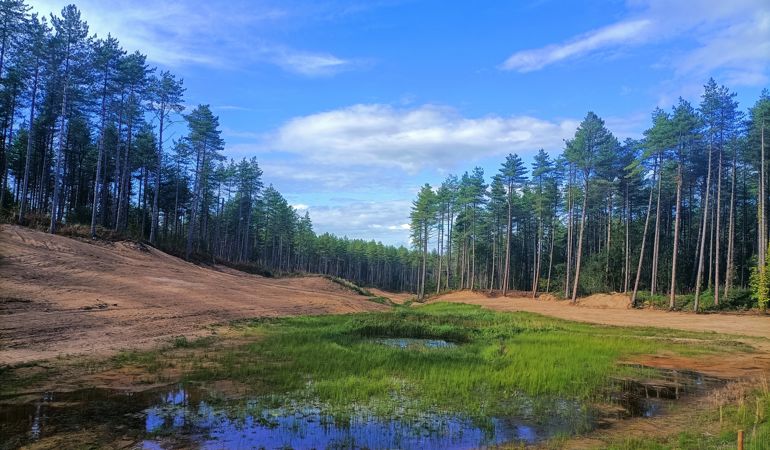Restoration work at Newborough has positive impact on biodiversity

A conservation project has completed £325,000 worth of restoration work at an Anglesey site.
Work carried out at Newborough National Nature Reserve and Forest this year includes large-scale restoration at several dune pools and relict dune slacks, 11 ha of conservation mowing, 4 km of new fencing, 9.5 ha of invasive non-native species control and more than 1.8 ha of dead conifer removal.
It was undertaken by Sands of LIFE, an EU-funded project led by Natural Resources Wales (NRW), working to restore sand dunes across Wales.
Newborough, a site of international biodiversity significance, is home to some of Wales’ most precious habitats and supports a range of rare orchids, amphibians, reptiles and invertebrates.
Jake Burton, Sands of LIFE Project Officer for NRW, said:
“We are very happy to have completed this year’s work programme at Newborough and can look back on a successful period that saw the project complete £325,000 worth of biodiversity restoration.
“Our works removed overgrown vegetation, created wider and gentler habitat transitions, and have increased the surface area of seasonally flooded habitat to help rare and threatened populations of shore dock, one of several specialist plants at Newborough, as well as improving conditions for the site’s European protected great crested newts.
“Slack scraping may sound and look extreme initially, however our work has been crucial to restore 4 ha of bare sand habitat that has gradually been disappearing from Newborough over the years.
“Thanks to this completed work a range of invertebrates, specialised plants and reptiles also have more crucial bare sand to call home.
“Our works have been vital and help protect and enhance biodiversity and the nature conservation value of Newborough. Making sure sites like these are healthy helps us tackle the climate and nature emergency.
“All Sands of LIFE work is delivered with the ambition of keeping Newborough’s sand dune and forest habitat healthy.
“We would like to thank members of the public for their support, and we will continue to work closely with members of the community and stakeholders on the management of this important, internationally recognised site.”
New stock fencing has been created alongside the installation of five gates to allow sustainable grazing, ensuring livestock is kept safe for years to come.
A programme of invasive alien species control focused on clearing cotoneaster, cherry laurel, montbretia and sea buckthorn, which if left unmanaged, can lead to the disappearance of wildflower meadows, free flowing streams, and pre-Cambrian rock ridges.
Richard Berry, NRW’s Land Management Team Leader for Newborough, said:
“We are glad to see Sands of LIFE work being completed as it will boost biodiversity, geology and wildlife and provide benefits moving forward.
“The work, which sits alongside NRW’s land management at Newborough, has helped enhance the conservation value of this site.”
